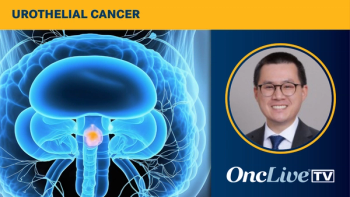
Impact of Maintenance Therapy on Metastatic Urothelial Carcinoma
The overall impact that maintenance therapy has had on patient outcomes in advanced or metastatic urothelial carcinoma.
Episodes in this series

Transcript:
Thomas Powles, MBBS, MRCP, MD: Maintenance therapy is something I’ve been investigating with the team I work in for 13 or 14 years. When I first started [investigating] metastatic urothelial cancer, it was apparent that chemotherapy was great at getting control of the disease, but the problem was the cancer grew back quickly. And when it grows back we know it’s pretty fatal quite quickly. Thus, the question really was, “Could we maintain that control?” That’s the principle of maintenance therapy, maintaining the control achieved by chemotherapy. Chemotherapy buys you time with metastatic urothelial cancer. Essentially, when you give chemotherapy, particularly the first 3 cycles, most patients get some control of disease. In that control it means you’ve got maybe 8 to 10 weeks before the cancer is going to start growing back again and causing problems.
We did the original trial with lapatinib. Dr Petros Grivas did a study with sunitinib. There are other maintenance trials. Dr Joaquim Bellmunt did a study with vinflunine. Unfortunately, those agents weren’t good at maintaining control because they were working in a similar way to chemotherapy. They weren’t associated with long-term durable remissions, and that’s why I was keen, [along with] Dr Matt Galsky and other groups, to look at the maintenance setting with immune therapy. There’s a difference with immune therapy, and we know from the second-line data and from the frontline data [that] there is a subgroup of patients [who] do well [and] have long-term durable remission.
The problem with giving it up front is that it doesn’t work in the majority of patients, and those patients will probably die more quickly because they’ll never get access to that chemotherapy associated with control. Thus, it really is that Goldilocks effect of not too late in the second-line setting but not too early where you can’t get control of the disease.
Now, some people say to me “Is there something special about avelumab compared [with] other immune checkpoint inhibitors?” The answer to that question in my opinion is no, there are some issues with avelumab—the ADCC [antibody-dependent cell-mediated cytotoxicity] and there are some other components—but actually it’s just doing exactly what you’d expect an immune checkpoint, a PD-1 inhibitor or PD-L1 inhibitor, to do in this setting, which is associated with durable remissions in a subset of patients.
We know from the maintenance avelumab data [that] it has an overall survival advantage but it also has a significant progression-free survival advantage. There is a tail to that progression-free survival curve at [approximately] 25% to 30%. And it’s suggesting that we’re maintaining good control in that significant proportion of patients, and that’s transformative because if you go back to that original lapatinib trial or Dr [Grivas’] sunitinib trial, there was no tail to the curves. All the patients progressed and then went on, the vast majority, unfortunately to die from metastatic disease. In that respect, the maintenance approach is transformative and it is practice changing.
Transcript edited for clarity.








































